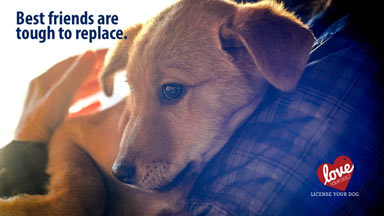Pennsylvania’s Rabies Law:
Ignoring Pennsylvania’s rabies vaccination law can be costly – in more ways than one. Dogs and cats are exposed to the rabies virus through wild and stray animals, posing a threat to their health and yours.
- Dogs and cats three months or older must have a current rabies vaccination
- Owners of non-vaccinated pets may be fined up to $300 plus court costs
- Licensed veterinarians can vaccinate dogs and provide a vaccination certificate
- Dog wardens perform random checks to ensure rabies vaccinations are current
License Your Dog. It’s the Law:
- All dogs three months or older must be licensed by Jan. 1 of each year
- Owners of non-licensed dogs can be cited with a maximum fine of $300 per dog plus court costs
- Dog wardens randomly canvass neighborhoods to ensure all dogs are licensed, violators may be fined
- If your dog gets lost, a current license is the fastest way to get your dog back home
- Licensing fees help the millions of dogs in Pennsylvania by funding the Bureau of Dog Law Enforcement
- Purchase a license from your local county treasurer or issuing agent
- An annual license is $8.50 and a lifetime license is $51.50, if your dog is spayed or neutered, the annual fee is $6.50 and lifetime is $31.50, discounts are available to older adults and people with disabilities
Pennsylvania’s Dog Laws:
- If your dog is not licensed, you may be fined up to $300 per dog. Get a license at your county treasurer’s office.
- Your dog must be under control and supervised at all times. You are responsible for any damages caused by your dog on someone else’s property.
- It is illegal to mistreat or abuse animals. Report suspected abuse to your local humane organization or police.
- Purposely poisoning a dog, whether it is yours or someone else’s, is illegal.
- You may not abandon or attempt to abandon any dog. You could be fined $1,000 plus court costs.
- Puppies under eight weeks old cannot be bartered, traded, sold, or transferred.
- You must have a kennel license if you keep, sell, transfer, adopt or foster at least 26 dogs in a calendar year.
- If your dog attacks or kills a human or domestic animal without provocation, it may be considered dangerous. You may face extensive fines and restrictions.
Where to Get a License
 Licensing your dog: it’s part of being a responsible pet owner. Do it for them, do it for every dog in PA.
Licensing your dog: it’s part of being a responsible pet owner. Do it for them, do it for every dog in PA.
Having a dog license is the best way to bring them home if they get lost. And the cost of your dog license allows the Bureau of Dog Law Enforcement to crack down on illegal kennels, investigate dog bites, and ensure dangerous dogs are not roaming the streets.
Dog licenses are available at Lehigh County Humane Society, 640 Dixon St., Allentown, PA 18103 or www.lehighcountyhumanesociety.org
#LoveYourDogLicenseYourDog
License Your Dog in PA
All dogs three months or older must be licensed by Jan. 1 of each year. Violators can be cited with a maximum fine of $300 per violation plus court costs.
An annual license is $8.50 and a lifetime license is $51.50. If the animal is spayed or neutered, the annual fee is $6.50 and lifetime is $31.50. Discounts are available to older adults and people with disabilities.
The small license fee helps the millions of dogs in the state by funding the Pennsylvania Department of Agriculture Bureau of Dog Law Enforcement.
Dog licenses are available from your local county treasurer and other licensing agents.
Reasons for dog licensing:
- It’s the law. All dogs three months and older must have a current license.
- If your dog gets lost, a license is the best way to get him back. A license helps animal control and shelters identify your dog and get him back home safely.
- The cost of a license is less than the penalty for being caught without one. Owners who fail to license their dogs could face a fine of up to $300 for each unlicensed dog.
- License fees support animal control. The annual fee you pay to license your dog helps keep shelters running and supports the work of the Bureau of Dog Law Enforcement, which is responsible for ensuring the welfare of dogs, regulating dangerous dogs and overseeing annual licensing and rabies vaccinations.
